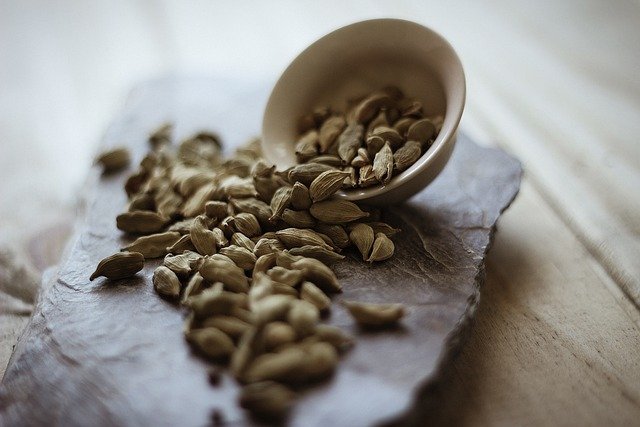Image by Ludmila Albor from Pixabay
Cardamom is a spice with a very distinctive, almost licorice-like flavor. Because of this it’s not commonly called for in many recipes, but it imparts a memorable kick to baked goods, desserts, and savory dishes. It’s also a popular ingredient in “moon milk,” a trending hot nighttime beverage with milk (or an alternative milk) combined with various spices.
It’s amazing to me that nearly every kitchen herb, if not every single one, not only improves the flavor profile of our food, but also confers health benefits as well. Three seem common to almost every herb: they all seem to be antioxidants, anti-inflammatory, and antimicrobial. Then there are a few unique properties of each one too. Here’s the list for cardamom.
Cardamom for Oxidative Stress
As mentioned, cardamom is a great antioxidant.
This study shows that 3 grams daily of cardamom (which is hard to get as a culinary herb—that would require a supplement) for a 12 week period increased antioxidant status by 90%.
This animal study shows that cardamom specifically restored levels of the antioxidants superoxide dismutase (SOD), catalase, and glutathione, and also blocked lipid peroxidation. This study also shows cardamom (as a supplement) raised glutathione levels and decreased lipid peroxidation.
Because oxidative stress is associated with tumorigenesis, cardamom is also protective against cancer.
Cardamom for Anti-Inflammatory Effects
Less oxidative stress tends to mean less inflammation.
Cardamom does indeed greatly decrease release of inflammatory cytokines and modulates immune function, especially when combined with black pepper. Cardamom also decreases nitric oxide production — which might sound like a bad thing at first blush, but too much nitric oxide is decidedly detrimental.
This study also shows that cardamom decreases COX-2 expression: the same pathway affected by NSAIDs.
Cardamom for Antimicrobial Activity
The third common feature in most medicinal herbs is antimicrobial activity, though cardamom has been better studied than many for this purpose.
This study shows that it is effective in fighting bacteria associated with dental cavities. (If you’re using cardamom for oral health, perhaps sweeten your moon milk with xylitol!)
Cardamom is also effective against candida albicans, as well as against a variety of other opportunistic or potentially pathogenic organisms.
Cardamom for Metabolism and Metabolic Syndrome
Many, though certainly not all culinary herbs also help to balance blood sugar. Cardamom happens to do it so well that it’s been compared to the diabetes drug pioglitazone.
This animal study shows that even in rats fed a high fructose corn syrup diet, cardamom kept blood sugar as stable as the control animals—suggesting that it might help correct for occasional dietary indiscretions.
This study shows that aromatherapy with the cardamom essential oil increases heart rate variability, a measure of stress tolerance and metabolic health, as well as improved oxygen utilization, another key indicator of metabolic (and specifically mitochondrial) health.
Cardamom for Hypertension
Cardamom stands out for its blood pressure regulation. This animal study shows that it helps to decrease blood pressure via increased urination.
This study showed that three grams of cardamom powder (again, in a supplementation range, more than a dietary range) over a 12 week period normalized blood pressure in patients newly diagnosed with hypertension.
Cardamom for Asthma
Cardamom has also been used traditionally for asthma. This study shows that it works by causing smooth muscle relaxation, with effects similar to those of the calcium-channel blocking antihypertensive medication verapamil. This suggests that the mechanism of cardamom’s blood pressure effects may also be due to calcium channel blocking—which may also make it useful for things like neuropathic pain and EMF sensitivity as well.
Cardamom for Digestive Health
Cardamom often pairs with fennel as a traditional herb for digestive health. It can act as a carminative after eating, but it also is protective against ulcers.
This animal study showed that at high supplementation doses, cardamom was more effective than ranitidine at preventing ulcers.
The Upshot
While effects similar to some of these studies will require supplementation, it’s not a bad idea to also reap some of the benefits of cardamom from your diet. Here are some of my favorite cardamom recipes:
Please rewrite the following sentence to make it sound more concise and clear:
“In the event that you are unable to attend the meeting, please notify us in advance.”
Source link






